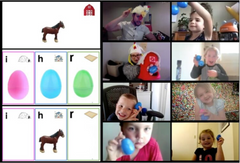
When the COVID-19 pandemic closed schools nationwide, students of all ages — from high-schoolers in Advanced Placement classes to preschoolers getting the hang of the ABCs — shifted to remote learning on a screen.
And while learning to read in an online setting may seem a tall order, a new study by the University of Washington’s Institute for Learning & Brain Sciences finds that children can develop key reading skills in a virtual classroom with other students. Researchers say their “Reading Camp” program demonstrates not only the effectiveness of the approach, but also the potential to reach larger numbers of students remotely, by necessity or by choice.
Online Reading Camp
“Children are ready to learn to read at the age of 5. But the pandemic robbed children of the opportunity for in-person reading instruction. What we’ve shown here is that an online Reading Camp designed to promote learning socially works phenomenally well. An online camp can be used all over the world by children anywhere, and that is truly exciting,” said faculty author Patricia Kuhl, co-director of I-LABS and a UW professor of speech and hearing sciences.

The study, published online March 31 in Frontiers in Human Neuroscience, details a two-week reading program, which teachers provided remotely to 83 5-year-olds beginning in fall 2020.
The study finds that the participants demonstrated learning of specific reading skills, such as phonological awareness and letter-sound knowledge, when compared to a control group of children who did not receive the instruction.
Early Literacy Skills
I-LABS researchers, including study co-author Jason Yeatman (now at Stanford University), in 2019 offered a two-week reading summer camp to teach early literacy skills to pre-kindergarteners and measure brain activity before and after instruction. With the onset of the pandemic in spring 2020, researchers decided to adapt the in-person Reading Camp into an online version over Zoom.

Ahead of the remote camp, researchers mailed parents a kit of materials, which included headphones, worksheets and books, as well as Play-Doh, toys and other fun items for use in the lessons. Children used colored plastic eggs from the kit, for example, to “vote” for the right answer in their virtual classroom, rather than raising a hand.
“This shows that we can actually teach kids online if we’re using the correct methodology, keeping them engaged, and they’re interacting socially with their peers and teachers,” said Yael Weiss-Zruya, a research scientist at I-LABS and the study’s first author. “Combining all of this made it successful.”
Phonological Awareness and More
Children in both the Reading Camp and control groups took several standardized and non-standardized tests to assess knowledge of letters, sounds and words. The results showed that the Reading Camp participants improved in all of the reading skills measured, and their phonological awareness and knowledge of lowercase letters and sounds, in particular, more than the children in the control group.
“Frankly, I had my doubts about whether 5-year-olds could learn to read online without a live tutor. But when I saw these 5-year-olds on Zoom laughing and encouraging each other to listen and hold up the right color egg, I was amazed. Their social connections to each other were obvious, and their learning was incredible. They called each other by name and seemed very eager to see each other on the screen,” Kuhl said.
Researchers plan to hold additional online reading camps, and to add brain scans prior to and after the camps to evaluate how learning to read affects brain development.
StepUp Note
As online learning has become one more option for teaching and learning, researchers are now working to measure the usefulness of online learning for different students, grade levels and academic skills. This study shows how online learning can be measurably useful for 5-year-olds who are learning to read. The study lists the specific reading skills in which the children made measurable progress. Progress was measured both by traditional testing and by medical studies of brain activity. These studies of brain activity show how learning can change our brain, in measurable ways.
The specific reading skills mentioned in this article include phonological awareness and letter-sound knowledge. StepUp programs provide Daily Practice exercises which include alphabet knowledge (seeing, naming and writing letters and letter sequences), and rhyming (phonological awareness). StepUp rhythms help children practice taking turns for listening then talking. And stepping exercises engage many muscles in the process of academic learning, which helps us focus our “whole-body” attention on learning.
